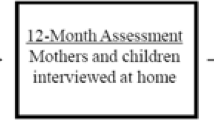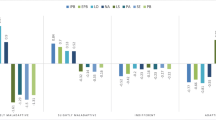Abstract
Although divorce is typically stressful for mothers, the formation of post-divorce dating relationships can help to ease this stress. Unfortunately, research has yet to empirically consider children’s post-divorce adjustment for mothers’ wellbeing leading up to and during mothers’ post-divorce dating. This study addresses the following questions: 1) How do children’s problem behaviors predict mothers’ depressive symptoms following divorce? 2) How do children’s problem behaviors predict the quality of mothers’ dating relationships and the rapport between children and mothers’ dating partners? 3) How do children’s problem behaviors, the quality of mothers’ dating relationships, child-dating partner rapport, and length of mothers’ dating simultaneously impact mothers’ depressive symptoms? Data for this study comes from a longitudinal investigation of recently divorced mothers and their children (N = 232). Hierarchical linear models revealed that mothers experienced more depressive symptoms when their children exhibited more internalizing behaviors. Children’s internalizing behaviors were negatively associated with the quality of mothers’ dating relationships. When examining these variables simultaneously, increases in children’s internalizing behaviors and decreases in relationship quality predicted increases in mothers’ depressive symptoms. Promoting family-level adjustment appears best for mothers’ wellbeing following divorce. Other implications for post-divorce adjustment are discussed.
Highlights
-
Children’s internalizing behavior predicted mothers’ depressive symptoms.
-
Children’s internalizing behaviors predicted declines in mothers’ relationships.
-
Relationship quality and children’s internalizing behaviors predicted mothers’ depressive symptoms.

Similar content being viewed by others
References
Ambert, A. (2001). The effect of children and parents. The Haworth Press.
Amato, P. R. (2000). The consequences of divorce for adults and children. Journal of Marriage and the Family, 62, 1269–1287. https://doi.org/10.1111/j.1741-3737.2000.01269.x.
Amato, P. R. (2010). Research on divorce: Continuing trends and new developments. Journal of Marriage and Family, 72, 650–666. https://doi.org/10.1111/j.1741-3737.2010.00723.x.
Anderson, E. R., & Greene, S. M. (2005). Transitions in parental repartnering after divorce. Journal of Divorce & Remarriage, 43, 47–62. https://doi.org/10.1300/J087v43n03_03.
Anderson, E. R., & Greene, S. M. (2011). “My child and I are a package deal”: Balancing adult and child concerns in repartnering after divorce. Journal of Family Psychology, 25, 741–750. https://doi.org/10.1037/a0024620.
Anderssen, N., Amlie, C., & Ytteroy, E. A. (2002). Outcomes for children with lesbian or gay parents: A review of studies from 1978 to 2000. Scandinavian Journal of Psychology, 43, 335–351. https://doi.org/10.1111/1467-9450.00302.
Bowen, M. (1991). Alcoholism as viewed through family systems theory and family psychotherapy. Family Dynamics of Addiction Quarterly, 1, 94–102. https://doi.org/10.1111/j.1749-6632.1974.tb40288.x.
Broderick, C. B. (1993). Understanding family process: Basics of family systems theory. Sage Publications, Inc.
Cartwright, C. (2010). Preparing to repartner and live in a stepfamily: An exploratory investigation. Journal of Family Studies, 16, 237–250. https://doi.org/10.5172/jfs.16.3.237.
Christian, A. (2005). Contesting the myth of the ‘wicked stepmother’: narrative analysis of an online stepfamily support group. Western Journal of Communication, 69, 27–47. https://doi.org/10.1080/10570310500034030.
Coleman, M., Ganong, L., & Mitchell, S. N. (2018). Divorce and postdivorce relationships. In A. L. Vangelisti, & D. Perlman (Eds.), The Cambridge handbook of personal relationships (2nd ed., pp. 106–116). Cambridge University Press.
Demir-Dagdas, T. (2021). Parental divorce, parent–child ties, and health: Explaining long-term age differences in vulnerability. Marriage & Family Review, 57, 24–42. https://doi.org/10.1080/01494929.2020.1754318.
Di Nallo, A. (2019). Gender gap in repartnering: The role of parental status and custodial arrangements. Journal of Marriage and Family, 81, 59–78. https://doi.org/10.1111/jomf.12527.
Ehrlich, J. (2014). Divorce and loss: Helping adults and children mourn when a marriage comes apart. Rowman & Littlefield.
Finley, G. E., & Schwartz, S. J. (2010). The divided world of the child: Divorce and long-term psychosocial adjustment. Family Court Review, 48, 516–527. https://doi.org/10.1111/j.1744-1617.2010.01326.x.
Ganong, L., & Coleman, M. (2017). Courtship in Stepfamilies. In Stepfamily Relationships (pp. 61–83). Springer. https://link.springer.com/chapter/10.1007/978-1-4899-7702-1_4.
Ganong, L., Jensen, T., Sanner, C., Russell, L., Coleman, M., & Chapman, A. (2019). Linking stepfamily functioning, marital quality, and steprelationship quality. Family Relations, 68, 469–483. https://doi.org/10.1037/fam0000518.
Garneau, C. L., Higginbotham, B., & Adler, B. F. (2015). Remarriage beliefs as predictors of marital quality and positive interaction in stepcouples: An actor–partner interdependence model. Family Process, 54, 730–745. https://doi.org/10.1111/famp.12153.
Hetherington, M. E., & Clingempeel, G. (1992). Coping with marital transition: A family systems perspective. Monographs of the Society for Research in Child Development, 57, 1–242. https://doi.org/10.2307/1166050.
Hetherington, E., & Kelly, J. (2002). For better or for worse: Divorce reconsidered. W. W. Norton & Co.
Huston, T. L., & Vangelisti, A. L. (1991). Socioemotional behavior and satisfaction in marital relationships: A longitudinal study. Journal of Personality and Social Psychology, 61, 721–733. https://doi.org/10.1037/0022-3514.61.5.721.
Jensen, T. M., & Lippold, M. A. (2018). Patterns of stepfamily relationship quality and adolescents’ short-term and long-term adjustment. Journal of Family Psychology, 32, 1130–1141. https://doi.org/10.1037/fam0000442.
Jensen, T. M., Lippold, M. A., Mills‐Koonce, R., & Fosco, G. M. (2018). Stepfamily relationship quality and children’s internalizing and externalizing problems. Family Process, 57, 477–495. https://doi.org/10.1111/famp.12284.
Jensen, T. M., & Ganong, L. H. (2020). Stepparent–child relationship quality and couple relationship quality: Stepfamily household type as a moderating influence. Journal of Family Issues, 41, 589–610. https://doi.org/10.1177/0192513X19881669.
Koster, T., Poortman, A. R., van der Lippe, T., & Kleingeld, P. (2021). Parenting in postdivorce families: The influence of residence, repartnering, and gender. Journal of Marriage and Family, 83, 498–515. https://doi.org/10.1111/jomf.12740.
Lengua, L. J., & Kovacs, E. (2005). Bidirectional associations between temperament and parenting and the prediction of adjustment problems in middle childhood. Applied Developmental Psychology, 26, 21–38. https://doi.org/10.1016/j.appdev.2004.10.001.
Levitzki, N. (2009). Parenting of adult children in an Israeli sample: Parents are always parents. Journal of Family Psychology, 23, 226–235. https://doi.org/10.1037/a0015218.
Monostori, J., & Murinkó, L. (2018). Household and family structure. Demographic Portrait of Hungary, 179–199. http://www.demografia.hu/en/publicationsonline/index.php/demographicportrait/article/download/957/729.
Montgomery, M. J., Anderson, E. R., Hetherington, E., & Clingempeel, W. (1992). Patterns of courtship for remarriage: Implications for child adjustment and parent–child relationships. Journal of Marriage and the Family, 54, 686–698. https://doi.org/10.2307/353254.
Morrison, S. C., Fife, S. T., & Hertlein, K. M. (2017). Mechanisms behind prolonged effects of parental divorce: A phenomenological study. Journal of Divorce & Remarriage, 58, 44–63. https://doi.org/10.1080/10502556.2016.1262652.
Murray, L., Fiori-Cowley, A., Hooper, R., & Cooper, P. (1996). The impact of postnatal depression and associated adversity on early mother-infant interactions and later infant outcome. Child Development, 67, 2512–2526. https://doi.org/10.1111/j.1467-8624.1996.tb01871.x.
Meyer, D. R., Cancian, M., & Cook, S. T. (2017). The growth in shared custody in the United States: Patterns and implications. Family Court Review, 55, 500–512. https://doi.org/10.1111/fcre.12300.
Nielsen, L. (2017). Re-examining the research on parental conflict, coparenting, and custody arrangements. Psychology, Public Policy, and Law, 23, 211–231. https://doi.org/10.1037/law0000109.
Peterson, J. L., & Zill, N. (1986). Marital disruption, parent-child relationships, and behavior problems in children. Journal of Marriage and Family, 48, 295–307. https://doi.org/10.2307/352397.
Radloff, L. S. (1977). The CES-D scale: A self-report depression scale for research in the general population. Applied Psychological Measurement, 1, 385–401. https://doi.org/10.1177/014662167700100306.
Raley, R. K., & Sweeney, M. M. (2020). Divorce, repartnering, and stepfamilies: A decade in review. Journal of Marriage and Family, 82(1), 81–99. https://doi.org/10.1111/jomf.12651.
Raudenbush, S. W., & Bryk, A. S. (2002). Hierarchical linear models: Applications and data analysis methods. SAGE Publishing.
Rusbult, C. E. (1980). Commitment and satisfaction in romantic associations: A test of the investment model. Journal of Experimental Social Psychology, 16, 172–186. https://doi.org/10.1016/0022-1031(80)90007-4.
Schnor, C., Pasteels, I., & Van Bavel, J. (2017). Sole physical custody and mother’s repartnering after divorce. Journal of Marriage and Family, 79, 879–890. https://doi.org/10.1111/jomf.12389.
Shafer, K., Jensen, T. M., & Holmes, E. K. (2017). Divorce stress, stepfamily stress, and depression among emerging adult stepchildren. Journal of Child and Family Studies, 26, 851–862. https://doi.org/10.1007/s10826-016-0617-0.
Singer, J. D., & Willett, J. B. (2003). Applied longitudinal data analysis: Modeling change and event occurrence. Oxford University Press.
Symoens, S., Colman, E., & Bracke, P. (2014). Divorce, conflict, and mental health: How the quality of intimate relationships is linked to post‐divorce well‐being. Journal of Applied Social Psychology, 44, 220–233. https://doi.org/10.1111/jasp.12215.
Tach, L. M., & Eads, A. (2015). Trends in the economic consequences of marital and cohabitation dissolution in the United States. Demography, 52, 401–432. https://doi.org/10.1007/s13524-015-0374-5.
Thuen, F., & Rise, H. (2006). Psychological adaptation after marital disruption: The effects of optimism and perceived control. Scandinavian Journal of Psychology, 47, 121–128. https://doi.org/10.1111/j.1467-9450.2006.00499.x.
Tosi, M., & Albertini, M. (2018). Does children’s union dissolution hurt elderly parents? Linked lives, divorce and mental health in Europe. European Journal of Population, 35, 695–717. https://doi.org/10.1007/s10680-018-9501-5.
United States Census Bureau. Bureau of the Census. (2000). United States Census 2000 (Vol. 3). Bureau of the Census.
Vanassche, S., Corijn, M., Matthijs, K., & Swicegood, G. (2015). Repartnering and childbearing after divorce: Differences according to parental status and custodial arrangements. Population Research and Policy Review, 34, 761–784. https://doi.org/10.1007/s11113-015-9366-9.
Weaver, J. M., & Schofield, T. J. (2015). Mediation and moderation of divorce effects on children’s behavior problems. Journal of Family Psychology, 29, 39 https://doi.org/10.1037/fam0000043.
Whiffen, V. E., & Gotlib, I. H. (1989). Infants of postpartum depressed mothers: Temperament and cognitive status. Journal of Abnormal Psychology, 98, 274–279. https://psycnet.apa.org/buy/1989-40195-001.
Acknowledgements
This research was supported in part by a grant from the National Institute of Child Health and Human Development, R01 HD41463-01A1. We would also like to acknowledge Holly Reidelbach for all of her hard work with collecting data for this study.
Author information
Authors and Affiliations
Contributions
All authors contributed to the study conception and design. Material preparation and data collection were performed by E.R.A. and S.M.G. The first draft of the manuscript was written by M.R.L., and revisions and updated drafts were written by J.S.D. and M.R.L. M.R.L. conducted the analyses for this study. All authors read and approved the final manuscript.
Corresponding author
Ethics declarations
Conflict of Interest
The authors declare no competing interests.
Additional information
Publisher’s note Springer Nature remains neutral with regard to jurisdictional claims in published maps and institutional affiliations.
Rights and permissions
About this article
Cite this article
DeAnda, J.S., Langlais, M.R., Anderson, E.R. et al. Examining Children’s Problem Behaviors and Mothers’ Dating for Mothers’ Depressive Symptoms Following Divorce. J Child Fam Stud 30, 2165–2179 (2021). https://doi.org/10.1007/s10826-021-02029-8
Accepted:
Published:
Issue Date:
DOI: https://doi.org/10.1007/s10826-021-02029-8




